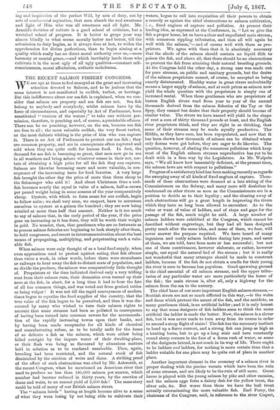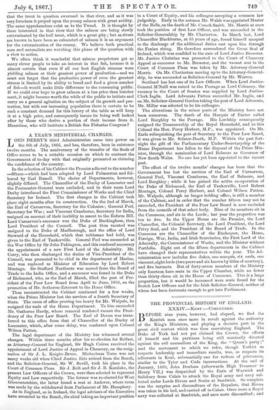THE RECENT SALMON FISHERY CONGRESS.
WE are apt at times to feel annoyed at the great and increasing attention devoted to Salmon, and to be jealous that the same interest is not manifested in codfish, turbot, or herrings. But this indifference about our sea fish is explained, when we con- sider that salmon are property and sea fish are not. Sea fish belong to anybody and everybody, whilst salmon have by the force of circumstances, and especially by Act of Parliament, been constituted " venison of the waters ;" to take one without per- mission, therefore, is poaching and, of course, a punishable offence. There can be no poaching, however, on the sea, because sea fish are free to all ; the most valuable codfish, the very finest turbot, or the most delicate whiting is the prize of him who can capture it. There is no Act of Parliament to protect our sea fish ; they are common property, and are in consequence often captured and sold when they are quite unfit for human food. In fact, the demand for sea fish is becoming so great, that men now go to sea in all weathers and bring ashore whatever comes in their net, cer- tain of obtaining a high price for all the fish they can capture. Salmon are likewise becoming more and more valuable, in con- sequence of the increasing taste for food luxuries. A very large Bah brought the other day the price of more than three sheep to the fishmonger who sold it! And about Christmas time a cod- fish becomes nearly the equal in value of a salmon, half-a-crown per pound weight being in some seasons of the year comparatively cheap. Oysters, with which to form sauce for our codfish, begin to follow suite ; we shall very soon, we suspect, have to accustom ourselves to oysters at a guinea the hundred ; they are now being retailed at more than half that amount. Neither is it too much to say of salmon that, in the early period of the year, if the price goes on increasing as it has done, they will be worth their weight in gold. No wonder, then, that gentlemen who are so fortunate as to possess salmon fisheries are beginning to look sharply after them, to hold congresses, and resort to intercommunication about the best means of propagating, multiplying, and perpetuating such a valu- able fish.
When salmon were only thought of as a local food supply, when even apprentices used to protest against eating that fish oftener than twice a week, in other words, before there were steamboats or railways to bear away the fish to distant seats of population, and so divide the produce, the salmon was comparatively little thought of. Proprietors at the time indicated derived only a very trifling rent from their salmon runs, their domestics even turned up their nose at the fish, in short, for a long time it had to bear the fate of all too common things, and was voted out from genteel tables as being vulgar It was not till the rapid conveyances of modern times began to equalize the food supplies of the country, that the true value of the fish began to be perceived, and then it was dis- covered by many who wished to turn their salmon rights to account that some streams had been so polluted in consequence of having been turned into common sewers for the accommoda- tion of the rapidly increasing towns upon their banks, and by having been made receptacles for all kinds of chemical and manufacturing refuse, as to be totally unfit for the home of so delicate a fish as the salmon, which were either being killed outright by the impure water of their dwelling-place, or their flesh was being so flavoured by obnoxious matters held in solution as to be rendered . unsaleable. Then, again, breeding had been restricted, and the natural stock of fish diminished by the erection of weirs and dams. A striking proof of the effect of such obstructions was cited by Mr. Ashworth, at the recent Congress, when he mentioned an American river that used to produce no less than 180,000 salmon per annum, which number had become reduced in thirty years, by the erection of dams and weirs, to an annual yield of 2,000 fish The same story could be told of many of our British salmon rivers.
The " salmon lairds " having at length become alive to a sense of what they were losing by not being able to cultivate their
waters, began to call into requisition all their powers to obtain a remedy as against the chief obstructions to salmon cultivation, i. e., fixed engines of capture and pollution. At present their leading idea, as expressed at the Conference, is, " Let us give the fish a proper home, let us have a clear and unpolluted main stream, with numerous rippling tributaries, and then all will again be well with the salmon,"— and of course well with them as pro- prietors. We agree with them that it is absolutely necessary that the abode of the salmon should contain no liquid filth to poison the fish, and above all, that there should bo no obstructions to prevent the fish from attaining their natural breeding grounds. At the Congress held the other day, a strong case was made out for pure streams, on public and sanitary grounds, but the desire of the salmon proprietors cannot, of course, be accepted as being exactly disinterested. Healthy water in great rivers undoubtedly means a larger supply of salmon, and at such prices as salmon now yield the whole question with the proprietors is simply one of increased rental. When those gentlemen who are proprietors of barren English rivers read from year to year of the annual thousands derived from the salmon fisheries of the Tay or the Spey, they cannot but desire that their property should become of similar value. The rivers we have named will yield in the shape of rent a sum of thirty thousand pounds at least, and the English river proprietors think, and they are right in so thinking, that• some of their streams may be made equally productive. The Ribble, as they have seen, has been repopulated, and now that it has been shown how thousands of salmon can be obtained where only dozens were got before, they are eager to do likewise. The question, however, of abating the numerous pollutions which keep most of the English salmon streams unproductive has yet to be dealt with in a firm way by the Legislature. As Mr. Walpole says, "We all know how lamentably deficient, at the present time,, the salmon laws are with respect to pollutions."
Progress of a satisfactorykind has been making recentlyas regards.: the sweeping away of all kinds of fixed engines of capture. Thou,. sands of these obstructions were doomed at a late sitting of the Commissioners on the Solway, and many more will doubtless be. condemned on other rivers as soon as the Commissioners are in a position to decide as to their legality ; and the clearing away of such obstructions will go a great length in improving the rivers. which they have so long been allowed to encumber. As to the- value or want of value of ladders, and of steps and gaps for the• passage of the fish, much might be said. A large number of salmon ladders were exhibited at the Congress, which cannot be described without engravings, but they had all been designed) pretty much after the same idea, and some of them, we fear, wilt never answer the purpose required. We have heard of many ingenious and costly salmon ladders during late years, and some- of them, we are told, have been more or less successful ; but not• one of these contrivances, however elaborate, or rather, however simple, cad equal the natural bed of the stream ; but it is really, not wonderful that many attempts should be made to construct. ladders, because if the fish do not obtain a cradle for their young: the river is sure to become less populous. Good spawning ground is the chief essential of all salmon streams, and the upper tribu- taries of any particular water are more particularly the home of the fish ; the main stream is, after all, only a highway for the salmon from the sea to the nursery.
The chief bane of our more important English salmon streams,— Scottish rivers are not so much afflicted in this way,—is the weirs and dams which prevent the ascent of the fish, and the antidote, as. many gentlemen think, is an artificial ladder ; and it is only honest• to say that some designers of fish ladders seem to think the more artificial the ladder is made the better. Now, the salmon is a clever- fish, but it was never made to turn away from its course in order- to ascend a steep flight of stairs I The fish has the necessary instinct to head up a fierce current, and a strong fish can jump as high as. a hunting horse, but to go up a long stair and turn constantly round sharp corners in the face of a fierce rush of water, as some of the designers intend, is not much in its way of life. There ought- to be ladders and ladders, for nothing is more certain than that a. ladder suitable for one place may be quite out of place in another- place.
Another important element in the economy of a salmon river is• proper dealing with the piscine vermin which have been the ruin of some streams, and are likely to be the ruin of still more. Great. havoc is played with the young salmon by pike and other enemies,. and the salmon eggs forhi a dainty dish for the yellow trout, the silver eels, &c. But worse than these we have the bull trout actually exterminating the more valuable fish. Earl Percy, the chairman of the Congress, said, in reference to the river Coquet,
that the trout in question swarmed in that river, and as it was very ferocious it preyed upon the young salmon with great avidity. The same apprehensions exist as to the Tweed. It is thought by those interested in that river that the salmon are being slowly exterminated by the bull trout, which is a great pity ; but as rivers are known to have been so exhausted of salmon it is an argument for the extermination of the enemy. We believe both practical men and naturalists are watching this phase of the question with a view to action.
We often think it wonderful that salmon proprietors get so many clever people to take an interest in that fish, because it is almost certain that even if all our best English streams were yielding salmon at their greatest power of production—and we must not forget that the productive power of even the greatest stream is limited by its ability to breed and feed a given number of fish—it would make little difference to the consuming public. If we could ever hope to grow salmon at a leas price than butcher meat, it might become worth the while of the public to initiate and carry on a general agitation on the subject of its growth and pro- tection, but with our increasing population there is certain to be such a constant demand for this luxury of the table as will keep it at a high price, and consequently insure its being well looked after by those who derive a portion of their income from it. Meantime, who will institute a British Sea Fisheries Congress?































 Previous page
Previous page